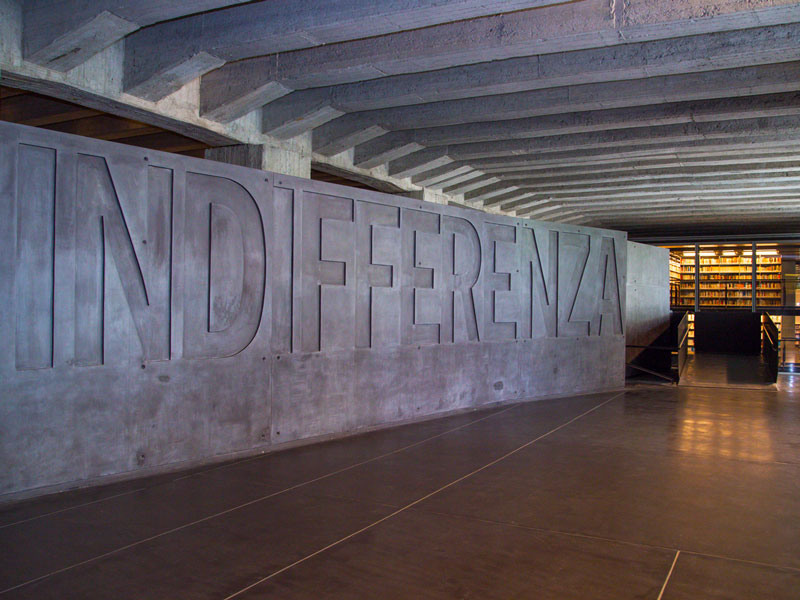Indifferenza
INDIFFERENZA
The word is etched in large letters on stone at Milan’s Shoah Memorial, a stark reminder of a time from December 1943 to January 1945 when 774 Italian Jews were deported from a subterranean train track under the city’s central station to Auschwitz-Birkenau and other death camps. The memorial calls this a “Wall of Indifference.” The names of the transported are arrayed on another wall by the track. Those shown in orange were the survivors, numbering only 27.
It was late during the Second World War. Italy, one third of the Axis with Germany and Japan, had switched sides as Allied forces fought their way up from Sicily and onto the Italian mainland. But the Germans still controlled the north, and Benito Mussolini, deposed as Il Duce, headed up a Nazi puppet state. The rump state ruled Milan, and, in spite of Mussolini’s ambivalence towards Jews and the Nazis’ Final Solution, he ensured that Italian collaborators carry out the deportations Hitler had decreed.
The first ghettos had originated in medieval Italy. But 20th century Italian Jews were fully integrated into society. Some even subscribed to Mussolini’s fascist movement. So passage in November 1938 of “racialization” laws declaring Jews as separate and subject to discrimination came as a shock. For a time the laws were unevenly enforced, and life went on as before. Jewish Italians lived in a bubble of belief that what was occurring in Germany could not happen here.
But, as depicted in the 1970 film “The Garden of the Finzi-Continis,” their cloistered world shrunk as, under pressure from Nazi Germany, Italian authorities increasingly imposed the antisemitic laws. Jews could no longer hold many positions, send their kids to public schools, serve in the army, or intermarry. A census identified all 48,000 Italian Jews, a roll call to facilitate their extermination. Many, if not most non-Jewish Italians were indifferent.
When conditions worsened, many non-Jewish Italians hid or harbored their Jewish neighbors, friends and associates or helped them escape to Switzerland or France. But other Gentiles remained indifferent. That seemed to be the case also in the puppet state that included Milan. It was only after the partisans helped to topple the regime and fatally shot Mussolini in April 1945 that fascism finally fell.
That one word, indifferenza, helps to explain how fascism, with all its populist appeal, could, with its promise of economic wealth and security, take hold of a country and its people . Not far from the Shoah Memorial in Milan (which I did not find in the Lonely Planet’s guide to the city) is the Piazzalle Loreto, where Mussolini’s corpse was hung upside down from a metal girder along with those of his mistress and two others. There is no plaque there.
Since Nov. 5, I’ve been at a loss for words to capture my feelings towards the election results that have returned to power an individual who Gen. Mark Milley, his former chairman of the joint chiefs of staff, labeled “fascist to the core.” One understandable response is to retreat from the public square, to take a break from the news, to anchor inside the safe harbor of indifferenza, of indifference. Then, a visit to the Shoah Memorial in Milan brought it all home to me. As history teaches, and the memorial underscores, indifference solves nothing. But don’t just take my word for it. You can look it up.
Or you can take comfort in Milley’s post-election comment to MSNBC’s Stephanie Ruhle: “”Bottom line is breathe deep, America’s going to be okay.” Your choice. As the saying goes, it’s a free country–at least for now. So go ahead, breathe deep. Just don’t ever be indifferent.

Good piece, Gene
Milley is a classic soldier. When backed into a corner-be brave. He knew if he spoke out and Trump won he would be in the cross hairs. Weare not just in for a rough ride. We are in for a crash landing.
Impressive!
Thanks for this, Gene.
Great writing; not just a hot take.